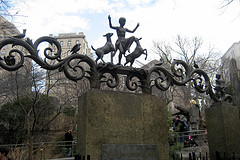Nancy’s Imaginary Line
Last year, one of my teachers, named Nancy, poked her nose into my office with an impish look on her face. She said, “I know you’re busy, but I just HAVE to tell you about what happened with my class this morning.”
Nancy had taken a group of students, aged 7-9, to do what she thought was an exciting outdoor activity. She was impatient to get through the instructions so they could get to the fun.
Her little group stood restlessly around the closed box which contained the equipment for their activity. She took out 2 pylons and placed them approximately 3 metres apart and asked students to, “Please stand behind the imaginary line that is between the two pylons.”
The students walked over to the space between the two pylons and all stared down at the ‘imaginary line’.
“How thick is the imaginary line so we don’t step on it?”
“I like pink, is it okay if my line is pink?”
“Oh, my line is a zigzag line, so where do I stand?”
“What does an imaginary line really look like anyways?”
“How will I know if the line moves because it’s ‘imaginationish’?”
“Why do they only make pylons orange?” (He was focused on what was holding this line together.)
“Is the line tied to the pylons?”
“Which side of the line do we stand on?”
“Is the line on the ground or off the ground so we know how high to step?”
“Could we please use an imaginary rope instead?”
“How long does the line really go?”
I should tell you that this group of students was not typical. One of Nancy’s talents is working with students who do not naturally show their learning in ways that have come to be accepted as bread and butter in a regular classroom. She is able to find the way in, help them find the tools they need, and build their confidence in showing what they know and can do.
This beautiful exercise in imagination and creative play would never have been allowed to unfold if Nancy had remained focus on the objective of the lesson. Too often, these opportunities, to listen to students and see their ability to play with ideas, are missed when we are looking for a single, correct response. Good questions, good activities, and good assessment practices, open us up to the minds of our students. And even though they might be completely off base, or travelling down an unexpected path, they provide information to us about their learning and their mental processes that is so critically important.
Nancy learned a great deal that day about her students. She had a glimpse into a world where these students where brilliant masters of their own design. They weren’t learning disabled. They weren’t behaviour kids. They weren’t being rude or trying to derail the lesson. They just wanted to wonder. And Nancy….she just let them.

